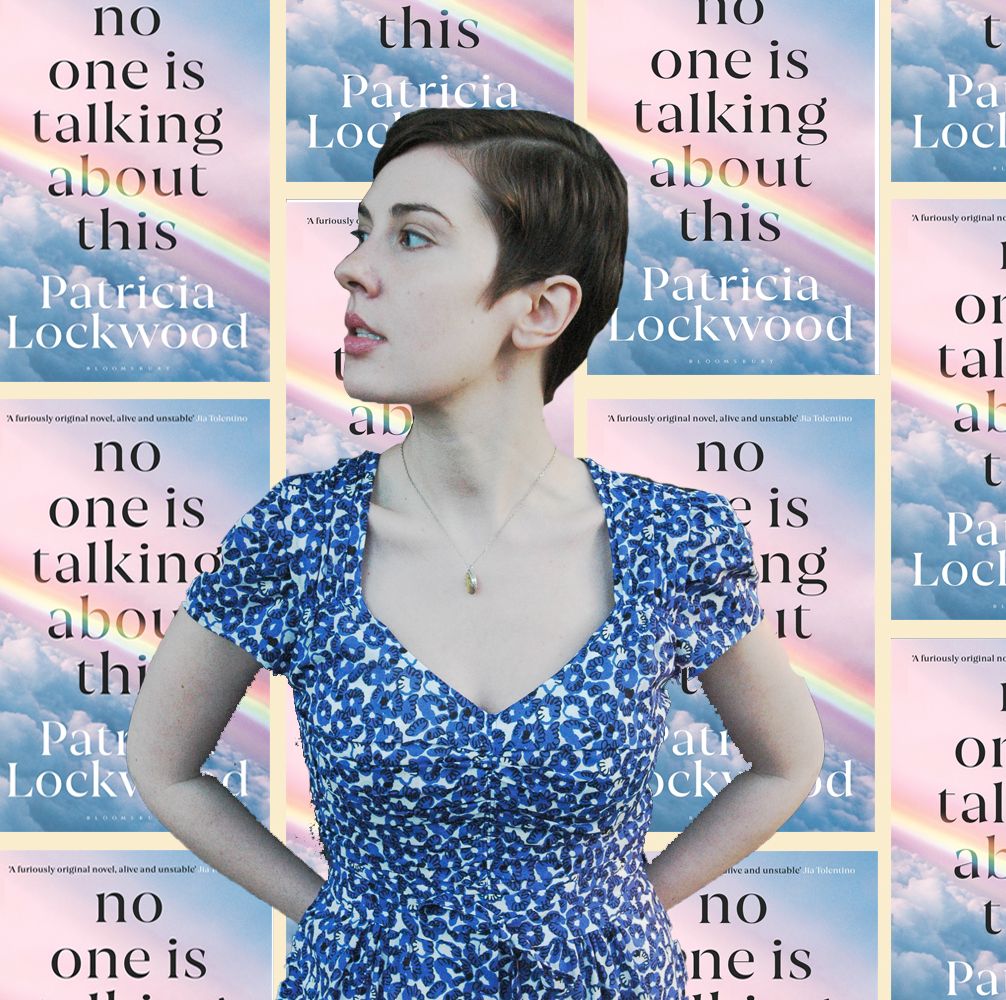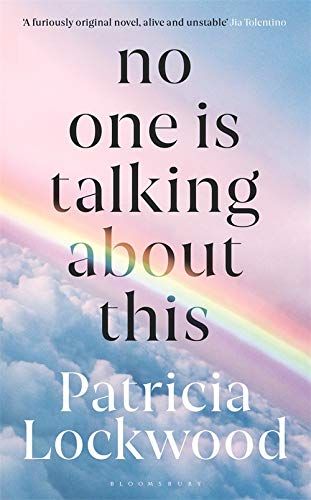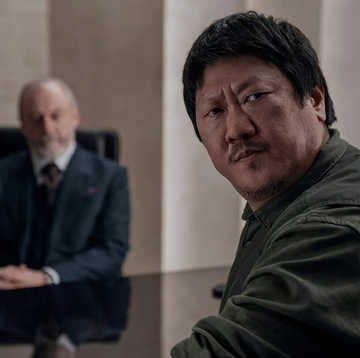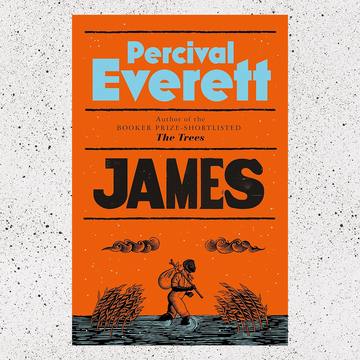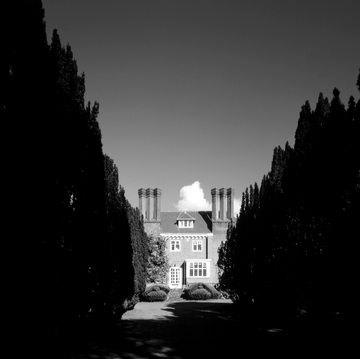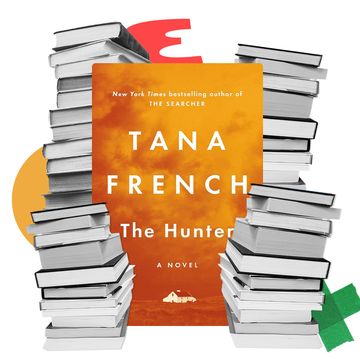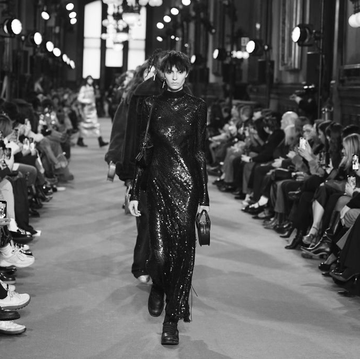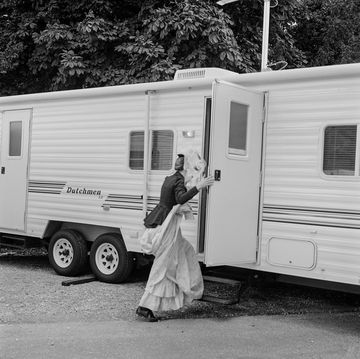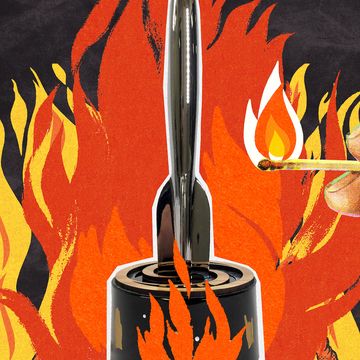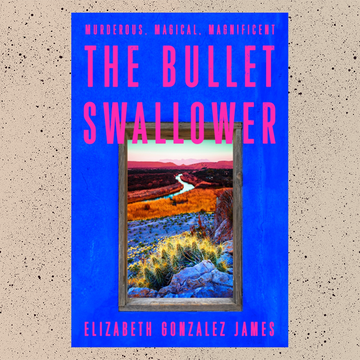A strange thing happened to Patricia Lockwood recently. The sort of thing that you might share a screenshot of and describe as being SO 2021, or compare to Black Mirror. You might even want to SHOOT IT INTO YOUR VEINS.
Lockwood was "reading the internet" and skimmed past a photograph of a Twitter friend on their wedding day, gathered at an oyster bar in Grand Central Station. There she was, or at least, there was the back of her, unknowingly sat with her friends in the frame of the photograph; the virtual realm of the internet colliding with the real world in a way that felt like a cartoon character jumping out of the television to shake your hand. "I’d never met her in real life and I was physically present in her picture," Lockwood says. "That’s not an experience that can happen in any other way, where you just leap that delineation of existing in the real world and online."
The versions of ourselves that live online, and the strange ways they become entangled with the version of us on the other side of the screen, are everywhere in Lockwood's new book, No One is Talking About This. In the novel, the page mimics the screen, and fragments of outrage and laughter are threaded together in a maddening jumble which you scroll through like a feed. There are absurd headlines, spirals of rage over what someone has done now, and brainwaves which the protagonist breezily hits send tweet to, all making up a cloud which feels like drifting through the ether of the online.
Patricia Lockwood was born in Indiana and raised in 'all the worst cities in the Midwest'. These cities are the backdrop to her sublime 2017 memoir, Priestdaddy, which recounted her experience of growing up with an eccentric Catholic priest for a father (one with a penchant for distressing jam sessions on his guitar and avoiding wearing trousers) and a mother fixated on the various things that might kill you. Lockwood's writing is riotously funny, serving joke after joke and waiting until the laughter subsides before delivering something crushing which catches you off guard.
We speak over Zoom the week after Trump supporters stormed the Capitol in a failed insurrection. Lockwood talks from her home in Savannah, Georgia, the state which handed the Democrats control of the Senate thanks to two run-off elections the day before the chaos in Washington. She had been deeply superstitious in the lead up to the presidential election and run-offs, but after the wins of Reverend Raphael Warnock and Jon Ossoff were all but confirmed, she went to the hairdressers ahead of having her photograph taken. "I had to go to the salon and be getting my snippies while not knowing whether people are being mass executed in the chamber," she says of the low murmur which was growing around her as she was having her hair rinsed. "It was one of the most surreal experiences. So probably don’t be getting haircuts right now."
Lockwood had witnessed Trump supporters driving into Savannah, a Democratic stronghold in the state, with gigantic trucks and flags to intimidate people, and seen a disheartening response, as some "little old ladies [threw] the Sieg Heil to the Trump caravan". The day which saw the Q-Anon Shaman, armed militia and boomers who had radicalised themselves on Facebook milling round the chamber, taking selfies, stealing stationary, or chanting 'Hang Mike Pence', feels like a summation of how our Extremely Online lives are seeping into real life. This convergence of reality and the internet, as well as the crumbling of sanity within fringes of the right, are themes which run through both of Lockwood's books.
Lockwood has a unique vantage point of right-wing ideology, having grown up in a family dominated by the Catholic church, and within a culture so dedicated to Midwest pro-life culture that even your pizzeria could be anti-abortion. "The phrase ‘a holocaust of innocents’ is the terminology they would use," she says. "People who have not grown up in that movement think that that’s just kind of put on, but I knew people, my parents included, where that is what they believe in an extremely literal, childlike way."
When she was 19 she had to "deprogram herself" by reading about abortion on the internet because she "had been fed so much information that was not just inaccurate but also weaponised insanity". Publishing Priestdaddy was an anxious experience, because not only was she talking about her family, but about a parish filled with many other people, and a religion with millions more. The book won awards and critical acclaim, and was even warmly received by some of the religious right for its respect of religion, though there were some one-star Amazon reviews she's pretty sure were from Catholics.
The experience made Lockwood feel exposed; not just like she was completely naked but as though her skin was gone too. Her experience of releasing her new novel has been stranger still, as in March last year she contracted Coronavirus. Fortunately she had finished writing the novel, but some of the cognitive and neurological effects lingered, meaning that she was finalising the book while, as she says, out of her mind. "I’d get edits and be like, ‘Fuck you I’m not taking that!’" she says. "Which is not typically true of me, but I was privately quite a diva." She also jokes that she is resentful of the year of writing which the illness robbed her from, saying that if she hadn't gotten sick she would have written five novels and been "splashing around in the mud like a big literary pig."
In No One is Talking About This, an unnamed woman finds relative fame when her tweet ('Can a dog be twins?') goes viral, and she tours the world off the back of said tweet. Lockwood was inspired to write the book in the tailspin which followed Trump's election, rereading Rachel Ingalls's novel Mrs Caliban she wondered, "What if I write about my version of doing the dishes which is not to do the dishes but to get on the internet instead."
Unaware it would be released into a world in which we were trapped at home, with the internet as our only portal out, Lockwood's book is a portrait of being trapped inside the web of viral nonsense and juicy clickbait. "The book talks about what happens when the internet is interrupted by the real world, " she says, something which we have witnessed happening in slow-motion under Trump. The novel begins just after he – referred to as The Dictator – takes office, and tracks the erosion of discourse over the years, providing a relic of when we still called cancelling someone 'calling them out', as well as having moments like the Unite the Right rally in Charlottesville just visible in the background of churning news.
There is a sense of the mania of the internet, where, 'It was no longer possible to go too far', and in which, 'On a fast news day, it was like we had swallowed all of NASCAR and were about to crash into the wall.' It is part of a wider trend of books pinning down the disorientating experience of being online on the page, with novels like Lauren Oyler's forthcoming Fake Accounts and Olivia Laing's recent Crudo mirroring the onslaught of information and giddy head-rush a screen provides.
Lockwood, who excels in a kind of deranged humour on her own Twitter account, is interested in our reluctance to see our time spent on the internet as an experience. "I think people want to give the impression that books are about real serious things," she says. "But I think the internet is a real serious thing. I think it’s possible to write a book that captures something of that." She also speaks of the homogenisation of language which sees us all using the same stock phrases as a way to respond to something, like seeing a lonely animal eating itself to death and posting, 'it me'. "Why have I allowed these strange bits of jargon and new building blocks of language come out my mouth and dictate how I package my experience?" she says, mentioning how we all use the same "ahahaha!" to signal something is really funny, while staring at the screen with a dead face. "I don’t like it when everyone’s making the same joke for the 28 hours of an internet news story cycle. I don’t like it when we all start to sound the same."
On the page the experience of the internet can feel even more intense than on the screen, but then there are fragments, like the viral story about the hotel who put out mini muffins to honour those killed in the September 11th attacks, where you laugh. Ahahaha! "Maybe it’s like Proust’s Madeleines," Lockwood says. "You see the 9/11 mini muffins and it triggers a cascade of all these other things."
In the second half of the novel the protagonist breaks free of 'the portal' as she becomes consumed by helping to care for her sister's ill baby, exploring abortion rights and motherhood in nuanced and tender ways. The dogma of the pro-life legislators which the family contends with goes back to Lockwood's own experiences of the religious right, something that has been harder to reconcile as she has seen, "Honourable Catholics throwing in their lot with this man who is so obviously an evil person."
In May 2016 Lockwood went to a Trump rally on the eve of the New Hampshire Republican primary to cover the event, recalling seeing droves of young Republicans wearing Pepe the Frog pins and popped collars, giddy at the upheaval of norms being ushered in. She saw then the rough shape of what we were headed for. "Those of us who were paying attention knew he was capable of trying anything," she says. "You didn’t know it was going to look like last Wednesday but you knew something was coming." Since the insurrection she has not been checking in with her parents, "for my own sanity" she says, though one of her siblings who is living at home sent a video of her mother taking apart the dishwasher to illustrate how she was responding to the news.
Lockwood's writing manages to be sympathetic to the causes she does not agree with without ever being condescending, and she is similarly so when she talks about some of the people who have been swept up in supporting Trump. "I think you also see that these are decent people, and like what has happened?" she says. "People have literally blackpilled themselves, and radicalised themselves on the internet"
She believes had she grown up in a bluer state, or maybe in a family that didn't use phrases like a 'Holocaust of innocents', perhaps she would never have become the sort of writer who reckoned with these complicated problems, though the still doesn't see herself as "this outspoken person climbing up on a podium and talking about the issues of the day". Instead she seems to arrive at it almost by accident.
"If I had not been raised among another kind of person I probably would have continued doing the Emily Dickinson thing for the rest of my life: wearing the white dress and throwing cookies at kids and not ever actually dealing with the specifics of my day," she says. "But I feel called to do this as much as I can. Sometimes you start out writing a book of internet jokes and it becomes something very different."
'No One is Talking About This' is out 16 February
Like this article? Sign up to our newsletter to get more articles like this delivered straight to your inbox
Need some positivity right now? Subscribe to Esquire now for a hit of style, fitness, culture and advice from the experts
